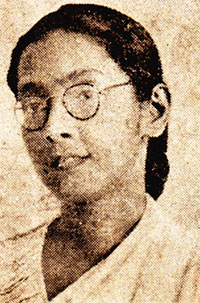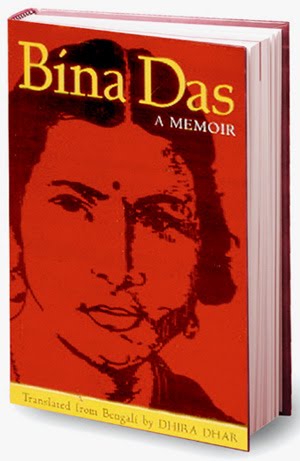Latest Contributions
Shooting the Governor of Bengal 1932
Category:

Bina (1911-19??), daughter of Beni Madhab Das (one Netaji Subhas Bose's teachers) and social worker Sarala Devi, was an Indian revolutionary and nationalist from Bengal. She was a member of Chhatri Sangha, a semi-revolutionary outfit for women in Kolkata. On 6 February 1932, she fired five shots at Bengal Governor Stanley Jackson, but failed to kill him. She was imprisoned and released in 1939, after which she joined the Congress party. In 1947, she married Jatish Chandra Bhaumik, an Indian independence movement activist belonging to the Jugantar group. After the death of her husband, she led a lonely life in Rishikesh and died in anonymity.
Editor's note: This article is reproduced from http://subhaschandrabose.org.
STATEMENT BEFORE THE SPECIAL TRIBUNAL OF CALCUTTA HIGH COURT, 1932

I confess that I fired at the Governor on the last Convocation Day at the Senate House. I hold myself entirely responsible for it. My object was to die and if I had to die, I wanted to do it nobly, fighting against this despotic system of government which has kept my country in perpetual subjection to its infinite shame and endless sufferings, and all the while fighting in a way which cannot but tell. I fired at the Governor impelled by my love for my country which is being repressed and what I attempted to do for the sake of my country was a great violence on my own nature too. It was a severe injury to the family to which I belong and the Institution where I was having my education - an Institution which loved me dearly and exercised the highest influence on my life and character, and which I looked upon with all regard due to a mother\; but the love for my country was always supreme in my mind\; and I felt very deeply in my heart at the miserable condition of my country. All the ordinances, all the measures to put down the noble aspirations for freedom in my countrymen, came as a challenge to our national manhood and as indignities hurled at it. This hardened even the tender feminine nature like mine into one of a hero's mould.
I had been thinking - is life worth living in an India so much subjected to wrongs and continually groaning under the tyranny of a foreign Government or is it not better to make one supreme protest against it by offering one's life away? Would not the immolation of a daughter of India and of a son of England awaken India to the sin of its acquiescence to its continued state of subjection and England to the iniquities of its proceedings? This was one question that kept thundering at the gates of my brain like incessant hammer blows which would neither be stilled nor muffled.
My sense of religion and morality is not inconsistent with my sense of political freedom. I believe that a person who is a slave politically cannot realise God who is the embodiment of the spirit of freedom and has made His sons and daughters free to share in the joy that is in Him. I have held, therefore, that political freedom is organically connected with religion and morality\; and there ought to be no conflict between them. In fact, I feel in my heart of hearts that the best and the divine in humanity cries out in revolt against all forms of tyranny in this world.
Political freedom, religion and moral ideals should, therefore, be blended together into one harmonious whole and the subject races inhabiting this globe should be politically free. It was for the purpose of bringing this fact home 1 selected as my field of action, the Convocation Hall of my sacred alma mater.
I studied in Diocesan College for my B.A. degree and passed with Honours in English and my father sent me to that College for an additional course of study for B.T. Degree, in order to bring me into closer touch with truly Christian souls and to give opportunities to see the best side of British Character. I gratefully acknowledge that I have immensely profited by my study under the Sisters of my dear College. But at the same time, with the comparative knowledge of things, I felt with deep anguish that the true Christian spirit was not much in evidence in the administration of a Christian Government.
The series of ordinances savouring of Martial Law, to my mind, showed nothing but a spirit of vindictiveness and were only measures to crush all aspirations for freedom. The outrages perpetrated in the name of Government at Midnapore, Hijli and Chittagong (my own district), the refusal to publish the Official Enquiry Reports and many more of such instances, were things I could never drive away from my mind. The outrages on Amba Debi of Contai and Niharabala of Chittagong literally upset my whole being. I used to help the wife of a detenu in her studies as a work of love. Every day I saw with my own eyes the sufferings of the poor girl who was leading the life of a widow during the life-time of her husband as also the demented parents of the detenu, slowly sinking into their graves, without their having the faintest notion of the supposed guilt of their son.
I attended the Court proceedings during the trial of my sister Kalyani. She was punished to serve a term of rigorous imprisonment for having allegedly attended a meeting which could not be held and for being a member of an unlawful society only on the basis of the evidence of her having a proscribed leaflet in her possession. This was to my mind grossly unjust. Though she is an Honours Graduate who had earlier lived in all the comforts of a middle-class family, yet ignominy was hurled on her during her prison-life. What with the jail-dress and jail-diet of ordinary convicts classified as third class prisoners, and the sleepless nights amongst such criminals, militated against my whole being. I saw all these with my own eyes and also witnessed the bitter tears welling out of the eyes of my dearest parents.
I thought that such must be the sufferings of innumerable others. All these and many other incidents worked on my feelings which worked themselves into a frenzy. The pain became unbearable till such time I felt that I would go mad if I could not find the relief in death. I only sought the way to death by offering myself at the feet of my country and invite the attention of all by my death as a mark of most immaculate form of protest against the situations created by the repressive measures of the government, which can unsex even a frail woman like myself, brought up in all the best traditions of Indian womanhood.
I can assure all that I could never have any personal grudge against any person or anything on earth\; I have no sort of personal feelings against Sir Stanley Jackson, the man and Lady Jackson, the woman. But the governor of Bengal represents the system of repression which has kept enslaved 300 millions of my countrymen and countrywomen.
Now I stand alone before the judgment seat of God and open myself before Him and pray for His all-forgiving love to wash me clean so that I may be a worthy offering to Him. May I see the benignant countenance of the Mother Divine and feel Her loving embrace for me - even for - at this most solemn moment of my life. If it be Her will that I should die, then let it be so. If She wills that I live, let me consecrate my life to the service of suffering humanity, which is the fondest longing of my heart, if She out of Her infinite mercy spares it to be used by Her as Her instrument. May God fulfil Himself through my death or my life, if it so pleases Him. Thy will be done. Oh Lord.
_____________________________________________________________

Her memoirs have been published by Zubaan Books.
Comments
Add new comment